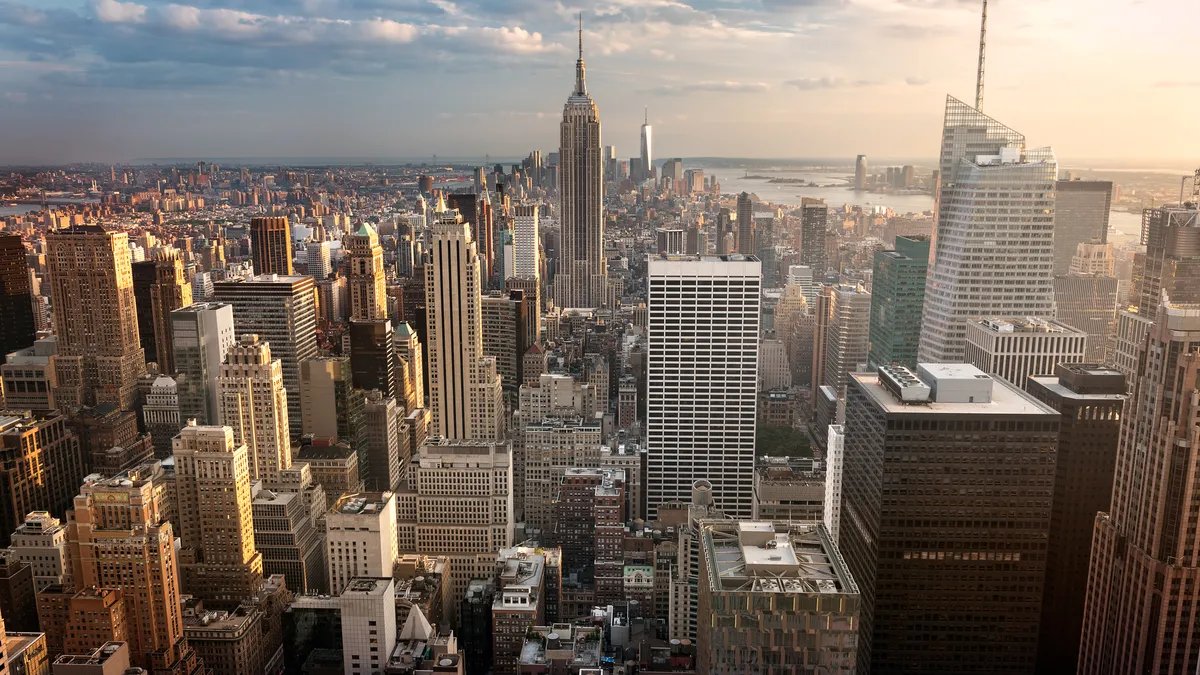Dive Brief:
- New York haulers are calling for the city’s commercial waste rate cap to increase by at least 9% to help offset rising costs on multiple fronts. The current maximum price allowed is $24.21 per cubic yard or $15.89 per 100 pounds.
- Comments from multiple companies cited a 9% increase in the Producer Price Index’s solid waste collection category since September 2022, along with rising costs related to disposal, labor, commercial containerization requirements and an upcoming congestion pricing system.
- Waste Connections, the National Waste & Recycling Association’s local chapter, Mr. T Carting, Century Waste Services, M&M Sanitation and D&D Carting all weighed in following a recent hearing by the city’s Business Integrity Commission.
Dive Insight:
Haulers throughout the industry have been raising prices to keep up with inflation and related costs in recent years, but in New York City that ability is more limited due to a regulatory process. Last year, the BIC approved a 9% increase in June and a 7% increase in October, the first time it had done so twice in one year.
The agency is required to hold a hearing on this issue every other year, but it is not obligated to make adjustments to the rate cap. In the past, adjustments have generally come multiple months after the hearings.
New York haulers face unique factors in their market in terms of local regulations, but multiple trends cited in comments relate to national issues.
Comments submitted by consultant David Biderman on behalf of Mr. T, Century, M&M and D&D note that disposal costs — which account for anywhere from one-third to one-half of the average hauler’s costs — have “increased substantially more than the Producer Price Index over the past 15 months.”
While some local haulers do own transfer stations, most of them do not own disposal assets — aside from Waste Connections and Interstate Waste Services (operating via the Action Environmental subsidiary). This means the sharp increase in tip fees from major landfill and incinerator companies is felt more strongly by transfer station operators and haulers. On average, companies represented in the letter have seen disposal pricing increase by 13.5%, and they have been notified that sizable cost increases are coming in 2024.
For labor, another major expense, the letter noted that the average cost increase for the four companies commenting was 6.3% since August 2022. Rising costs for equipment, maintenance and insurance were also cited.
From a national perspective, NWRA Vice President of Chapter Relations Lew Dubuque noted a 3% increase in labor costs and a 6% increase in tipping fees over the last year, in addition to other inflationary trends.
Beyond these factors, comment letters also noted other factors that are unique to the local industry. One is containerization, which the city’s Department of Sanitation has begun requiring for multiple categories of commercial businesses. All establishments must comply by March 2024.
“Very few commercial customers are purchasing their own waste container. Instead, they are relying on their carter to both provide and deliver multiple containers,” wrote Andy Moss, government affairs manager for Waste Connections.
Citing a delivery cost of $40-45 per container, and the expectation that customers often need more than one, the company estimates “the total delivery cost will run in the hundreds of thousands of dollars and is not recoverable as a separate fee under current Business Integrity Commission regulations.” Other haulers have also noted in recent months that it’s not always possible to recover these costs if certain accounts are already at or near the rate cap.
DSNY’s containerization rules call for businesses to use “rigid receptacles with tight-fitting lids,” but do not specify who should be procuring the containers or paying for them. When asked if the rollout had gone as expected, in terms of haulers taking the lead on procuring containers and in some cases incurring that cost, the agency did not offer a direct response. It also said any questions about pricing related to containerization were under the purview of BIC.
“Commercial containerization has significantly improved New York City’s streetscapes, ridding the city of piles of smelly trash bags. Businesses are largely complying, and we have received a lot of positive feedback on this long-overdue rule change,” said Press Secretary Vincent Gragnani in a statement.
Multiple comments also noted the looming costs of a congestion pricing system that will cover Manhattan south of 60th Street and could take effect next spring. Biderman’s letter suggested that BIC consider a potential congestion pricing surcharge of $10.80 per month per customer. Many other questions were raised about how the system would apply to haulers that may exit and enter this part of Manhattan multiple times per night.
A newly released plan from a Metropolitan Transportation Authority review board suggested that “large trucks” could potentially be charged a toll of $36. The plan recommends an exemption for publicly-owned vehicles providing “garbage pick-up,” but no such exemption is expected for commercial waste vehicles.
NWRA has long advocated for an end to the rate cap system, which was spurred by an organized crime crackdown in the 1990s, calling it “obsolete and outdated” in the latest comment letter. The association would prefer a more flexible system that allows members to raise rates at their discretion. Eventually, when the city transitions to a long-delayed zone system, haulers will utilize a different pricing structure for commercial waste collection.
Contract awards for that system are still pending and DSNY declined to comment on timing. As noted at a February city council hearing, the agency maintains it is on track to roll out the first pilot zone during the second half of 2024.















